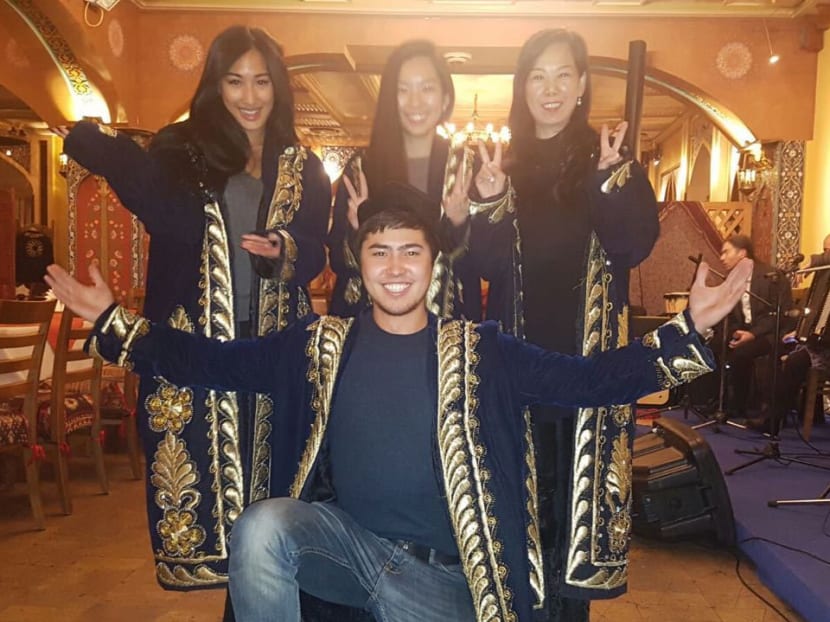Singaporean entrepreneurs ascend the vast terrains of Kazakhstan
SINGAPORE — At the age of 22, Singaporean Queenie Lee was on a holiday trip to Kazakhstan when she struck by the natural beauty of the country. She decided to set up a tour consultancy business subsequently after that first visit, as she was immediately taken in by the immense potential for tourism in what was then considered an “exotic” location in Central Asia.

Singaporean Queenie Lee decided to set up a tour consultancy business subsequently after that first visit, as she was immediately taken in by the immense potential for tourism in what was then considered an “exotic” location in Central Asia. Photo: Queenie Lee
SINGAPORE — At the age of 22, Singaporean Queenie Lee was on a holiday trip to Kazakhstan when she struck by the natural beauty of the country. She decided to set up a tour consultancy business subsequently after that first visit, as she was immediately taken in by the immense potential for tourism in what was then considered an “exotic” location in Central Asia.
Despite not knowing any Russian or Kazakh languages, the two most commonly used languages there, she decided to take the plunge. With her friend, a native Kazakh whom she had met while studying for her law degree in England, Ms Lee set about to realise her dream of starting her own tour business.
After one-and-a-half years of running the business, the travel consultancy is thriving and Ms Lee has led a slew of tours around the region. She now earns more than what she would be earning compared to if she had found a job using her degree as a law graduate, she shared with TODAY.
Ms Lee’s business venture Aveneer, is among a cluster of Singapore companies which has made its footprint in the former Soviet Republic. Other Singapore companies in Kazakhstan include education consultancy Educare, urban planning company RSP Architects Planners and Engineers and coffee and tea manufacturing company Food Empire.
Kazakhstan is located in Central Asia, flanked by neighbouring China, Mongolia, Russia, Kyrgyzstan and Uzbekistan. It is the world’s ninth biggest country by size.
Language is a key barrier faced by the Singaporean businesses there, the companies TODAY spoke to said. Other challenges include facing a different work culture, and understanding the law and regulations of the country.
“The first couple of months were the toughest because I did not understand Russian at all,” said Ms Lee. It was very frustrating for her to rely on a translator. The language barrier drove her to learn the Russian language quickly so she could be more efficient during her meetings.
Mr Lawrence Ler, associate director at RSP Architects Planners & Engineers said the business meetings would take much longer as they would require the assistance of a skilled translator who could understand the technical business terms.
However, both Mr Ler and Ms Lee are not deterred, and see the emerging business potential in the country. Mr Ler said with the growing affluence of the local population, there is “growing demand” for designer, quality finished, high-end residential developments in the coming years, adding that he sees “tremendous potential and endless opportunities” there.
Explaining why she chose to set up her tour business in Kazakhstan, Ms Lee said it was the attraction of opening up new experiences that drew her to the country. “Many Singaporeans have travelled to most Asian countries, however Central Asia is left unexplored,” she said.
Other than Singaporeans, Ms Lee has reached out to tourists from other South-east Asian countries. Her clients also come from North America and Europe, where there is growing interest to visit more “exotic” destinations that are off the beaten track.
Ms Lee’s tour consultancy focuses on creating luxury, exotic customised tours according to the client’s needs and budget, which Ms Lee feels is a niche market compared to the big tour groups that come to Central Asia which often lack “the personal touch”.
The tours organised by Aveneer usually take five to seven days, visiting world-renowned destinations such as the Big Almaty Lake and Charyn Canyon, one of the largest canyons in the world.
Other than personalised tours, Aveneer also conducts investment and business tours, and has introduced and facilitated Singapore companies to have a foothold in Kazakhstan and Uzbekistan in oil and gas and property development, shared Ms Lee.
According to Singapore’s Ministry of Trade and Industry, Kazakhstan is the Republic’s largest trading partner in Central Asia, with bilateral trade in goods between Singapore and Kazakhstan amounting to S$23.5 million in 2016.
This year, Singapore took part in the Astana Exposition in Kazakhstan with a showcase of its sustainable energy solutions.
In June, both countries concluded negotiations on the Bilateral Investment Treaty which seeks to open up more business and investment opportunities for Singapore and Kazakhstan businesses.








